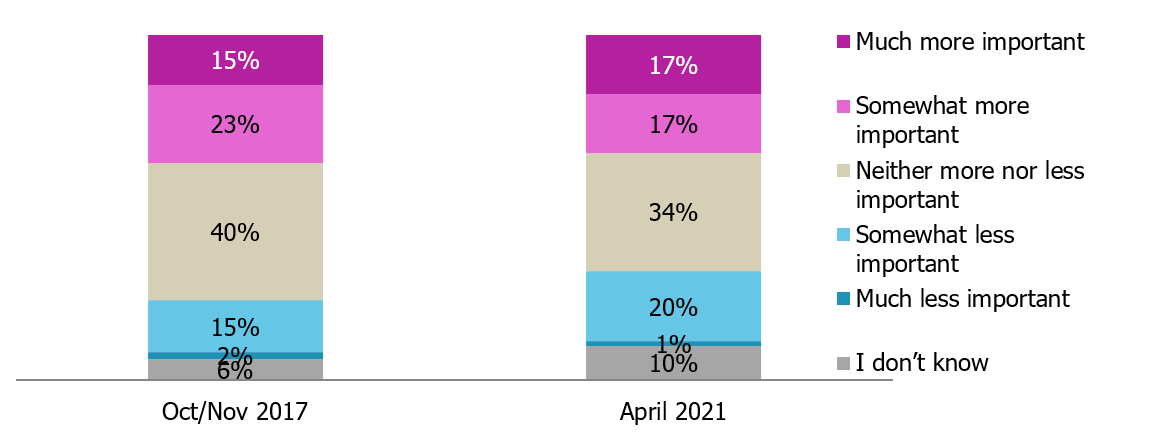In April this year, we surveyed 152 journalists who cover charities' work, to get their opinions on charities and the present and future issues facing the sector. One of the questions we put to journalists was whether they thought their role would be more or less important in helping charities get their message out in five years’ time. We first asked this question back in 2017, as the world was acclimatizing to its first social media president - Donald Trump - and the landscape of communications between citizens and politicians, and consumers and corporations, was beginning to shift. We wanted to find out what journalists thought of these changes and how it might shape their interactions with the third sector.
Only 1 in 3 journalists think they will play a more important role in helping charities get their message out in 5 years’ time

Do you think that journalists will play a more important or less important role in charities getting their message out in five years’ time?” Prompted question
Base: 152 journalists | Source: Journalists' Attitudes and Awareness Monitor, April 2021, nfpSynergy
As this chart shows, levels of optimism and pessimism about the importance of journalism amongst journalists have remained relatively consistent since 2017. Only 1 in 3 (34%) journalists think they will play a more important role in five years’ time which is very similar to the 38% that said the same in 2017. Whilst around 1 in 5 (21%) think they will play a less important role. Equally, one in three journalists (34%) think they will become neither more nor less important to the charity sector.
Why the pessimism?
So why do almost a fifth of journalists think their role will be less important in five years’ time? At the crux of the issue is the rise of social media. There’s no doubt we’re increasingly spending more time scrolling through various social media platforms. In fact, the average person spends almost 2.5 hours per day using social media. It’s becoming a leading way to communicate with others and find out what’s going on in the world around us – and charities have certainly taken this in their stride. Charities have been using social media as a campaigning tool, a method of communicating with supporters and donors, and a way of spreading messages to engage large audiences.
It’s no surprise some journalists think their role in helping charities getting their message out will be less important. One journalist from The Independent put it bluntly, saying “because charities can do it themselves on social media.” Another said:
“Social media has democratised the sharing of information. People are no longer solely reliant on journalism to receive news and hear about campaigns, a trend that will only increase in years to come.” (Tyla)
So, as a result, some journalists have a pretty bleak view of the importance of their role in the charity sector:
“Journalism as we know it is dying and charities are increasingly getting their message across through social media.” (Freelance journalist)
However, journalists offer a different form of communication
Although social media means charity content is right at people’s fingertips, there are still many things to consider. For example, how many people are engaging meaningfully with online content and how many are simply scrolling past? Charities may be able to get their message out to thousands of people this way, but many of these people are already warm to their cause. Traditional forms of media enable a far wider reach to a broader audience. This is one of the reasons mentioned for why over a third of journalists think they will have a more important role in charities getting their message out in five years’ time:
“Stories in hardcopy newspapers are also on the paper's websites and across the whole gamut of social media. That makes the reach of such stories immense.” (Daily Express)
The idea that journalists are skilled storytellers is a common theme for why some journalists believe their role will be more important. Journalists are often able to write compelling human stories that truly grip people. This, combined with the vast scope traditional forms of media provide, can be incredibly beneficial to cut through the noise and promote a cause far and wide:
“Journalists retain an important role as an invaluable "third party" in ensuring a charity message is conveyed across all media platforms, and that that message is promoted in a very effective way. Yes, charities can do their own social media, but media organisations still retain huge scope. Captain Tom succeeded because the local media and then global media got behind him - and the world's public followed.” (The Telegraph)
Does journalism have a renewed sense of importance?
The wider coverage and exposure journalists can give charities could be key to the post pandemic recovery of the sector. Charities are sitting in the uncomfortable position where the social and economic upheaval that has rocked the country has increased demand for their services, and yet this very instability has also prompted reductions in fundraised income (69% before the pandemic down to 55% in March 2021). Equally, media coverage has been dominated in recent years by the Brexit agenda and the global pandemic, meaning charities have often struggled to be heard.
However, the pandemic has already begun to relinquish its grip on society; there is cautious optimism that media and political attention will continue to diversify. As the following comments suggest, the traditional reach of journalism to stimulate important conversations at a national and local level could be fundamental in shaping the post-pandemic recovery:
“In the post Covid world there will be a reset, of the economy, the way we work, our treatment of vulnerable people. Charities are likely to play an increasing role in society and for that they will need journalists to get their message across.” (The People/Sunday Mirror)
“Recovery from the pandemic is vital for charities as they need to really step-up fundraising and awareness of the issues they are campaigning for. The press will play a key role in ensuring these messages get to as a wide a number of people as possible.” (Sunday Life)
Social media and mass disinformation
The rise of fake news and misinformation has given more importance to traditional forms of journalism as trusted sources. One journalist from The Express stated:
“the role of credible journalists to convey messages in an age where it is sometimes difficult to know what is fact and fiction, especially on social media, makes it more important than ever.”
The pandemic has highlighted this tension between formal and informal sources of information. Established bodies have had to compete with conspiracy theories and public figures have clashed with keyboard warriors over what is true and what is not. Social media has certainly had a part to play in this. Whilst in many senses it has democratised the spread of information and opinion, it has also, paradoxically, narrowed its authenticity and public consumption patterns. Citizens, individuals, consumers, and supporters of causes are now increasingly fed news cycles and information based on targeted social media ads and personalities they follow, which can easily lead to disinformation and echo chambers.
The authenticity provided by traditional forms of journalism means it could become an important outlet in the ‘post-truth climate’ of the modern day, as the public navigates what to believe and who to listen to.
So, is journalism dead?
Social media has no doubt revolutionised how we communicate and consume information. For charities, a social media presence is now a fundamental means of mobilising support and engaging with the public. However, the question of whether or not it can actually eclipse journalism is a separate matter. Not only is there a sense amongst journalists that they retain a unique ability to craft stories and reach wider audiences, but equally a strong suggestion that there could be a growing return to more established voices as the public becomes increasingly aware of the links between disinformation and social media. Journalism, for now, is certainly not dead.

